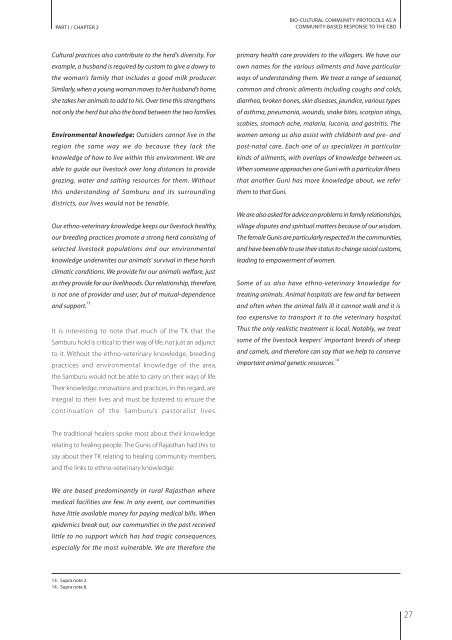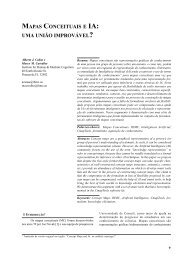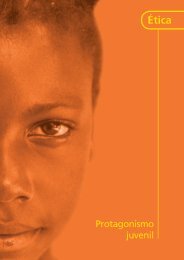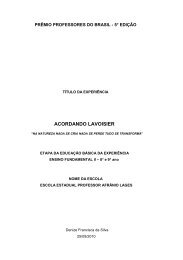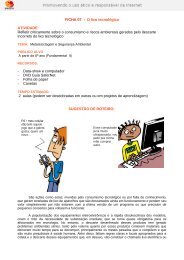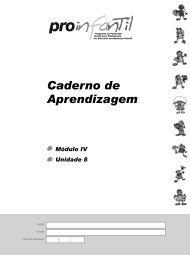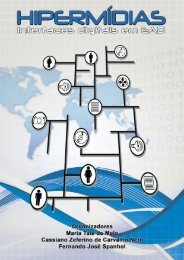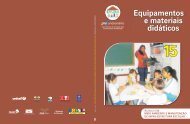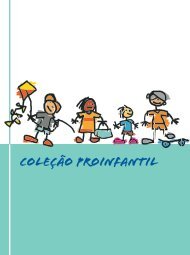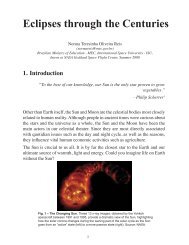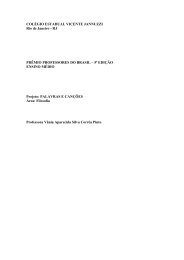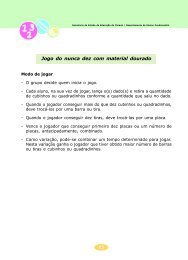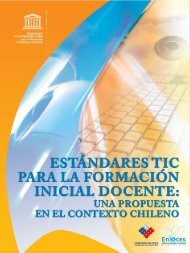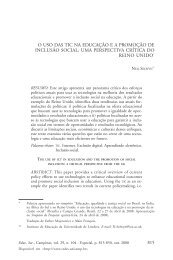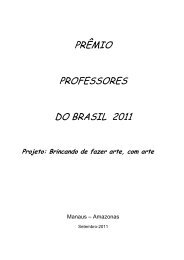BIO-CULTURAL COMMUNITY PROTOCOLS - Portal do Professor
BIO-CULTURAL COMMUNITY PROTOCOLS - Portal do Professor
BIO-CULTURAL COMMUNITY PROTOCOLS - Portal do Professor
Create successful ePaper yourself
Turn your PDF publications into a flip-book with our unique Google optimized e-Paper software.
PART I / CHAPTER 2<br />
Cultural practices also contribute to the herd’s diversity. For<br />
example, a husband is required by custom to give a <strong>do</strong>wry to<br />
the woman’s family that includes a good milk producer.<br />
Similarly, when a young woman moves to her husband’s home,<br />
she takes her animals to add to his. Over time this strengthens<br />
not only the herd but also the bond between the two families.<br />
Environmental knowledge: Outsiders cannot live in the<br />
region the same way we <strong>do</strong> because they lack the<br />
knowledge of how to live within this environment. We are<br />
able to guide our livestock over long distances to provide<br />
grazing, water and salting resources for them. Without<br />
this understanding of Samburu and its surrounding<br />
districts, our lives would not be tenable.<br />
Our ethno-veterinary knowledge keeps our livestock healthy,<br />
our breeding practices promote a strong herd consisting of<br />
selected livestock populations and our environmental<br />
knowledge underwrites our animals’ survival in these harsh<br />
climatic conditions. We provide for our animals welfare, just<br />
as they provide for our livelihoods. Our relationship, therefore,<br />
is not one of provider and user, but of mutual-dependence<br />
and support. 13<br />
It is interesting to note that much of the TK that the<br />
Samburu hold is critical to their way of life, not just an adjunct<br />
to it. Without the ethno-veterinary knowledge, breeding<br />
practices and environmental knowledge of the area,<br />
the Samburu would not be able to carry on their ways of life.<br />
Their knowledge, innovations and practices, in this regard, are<br />
integral to their lives and must be fostered to ensure the<br />
continuation of the Samburu’s pastoralist lives.<br />
The traditional healers spoke most about their knowledge<br />
relating to healing people. The Gunis of Rajasthan had this to<br />
say about their TK relating to healing community members,<br />
and the links to ethno-veterinary knowledge:<br />
We are based pre<strong>do</strong>minantly in rural Rajasthan where<br />
medical facilities are few. In any event, our communities<br />
have little available money for paying medical bills. When<br />
epidemics break out, our communities in the past received<br />
little to no support which has had tragic consequences,<br />
especially for the most vulnerable. We are therefore the<br />
13. Supra note 2.<br />
14. Supra note 8.<br />
<strong>BIO</strong>-<strong>CULTURAL</strong> <strong>COMMUNITY</strong> <strong>PROTOCOLS</strong> AS A<br />
<strong>COMMUNITY</strong>-BASED RESPONSE TO THE CBD<br />
primary health care providers to the villagers. We have our<br />
own names for the various ailments and have particular<br />
ways of understanding them. We treat a range of seasonal,<br />
common and chronic aliments including coughs and colds,<br />
diarrhea, broken bones, skin diseases, jaundice, various types<br />
of asthma, pneumonia, wounds, snake bites, scorpion stings,<br />
scabies, stomach ache, malaria, lucoria, and gastritis. The<br />
women among us also assist with childbirth and pre- and<br />
post-natal care. Each one of us specializes in particular<br />
kinds of ailments, with overlaps of knowledge between us.<br />
When someone approaches one Guni with a particular illness<br />
that another Guni has more knowledge about, we refer<br />
them to that Guni.<br />
We are also asked for advice on problems in family relationships,<br />
village disputes and spiritual matters because of our wis<strong>do</strong>m.<br />
The female Gunis are particularly respected in the communities,<br />
and have been able to use their status to change social customs,<br />
leading to empowerment of women.<br />
Some of us also have ethno-veterinary knowledge for<br />
treating animals. Animal hospitals are few and far between<br />
and often when the animal falls ill it cannot walk and it is<br />
too expensive to transport it to the veterinary hospital.<br />
Thus the only realistic treatment is local. Notably, we treat<br />
some of the livestock keepers’ important breeds of sheep<br />
and camels, and therefore can say that we help to conserve<br />
important animal genetic resources. 14<br />
27


